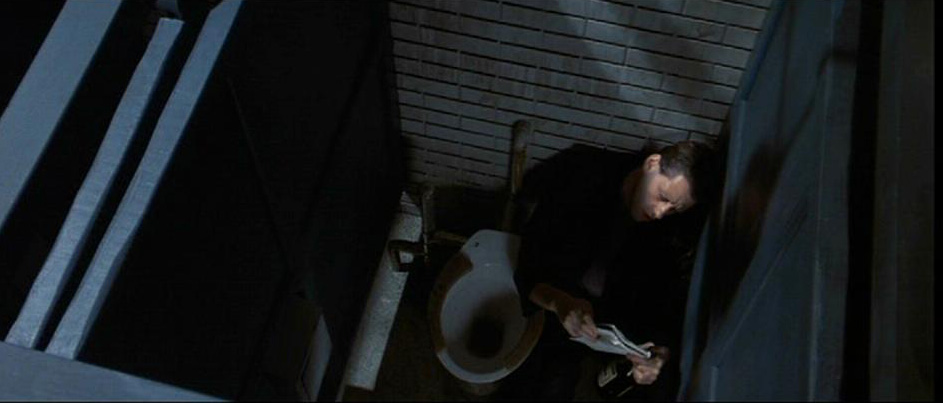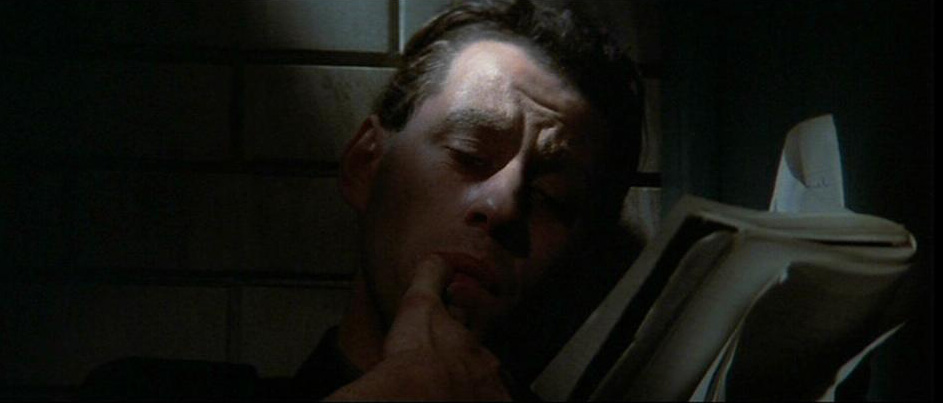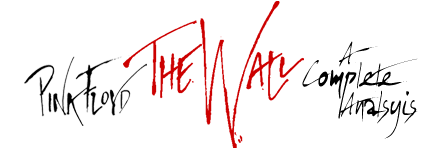Stop
[album: Roger Waters, movie: Bob Geldof]Stop!
I wanna go home.
Take off this uniform
And leave the show.
But I'm waiting in this cell
Because I have to know
Have I been guilty all this time?
Song In A Sentence:
Pink suddenly realizes the delusional depths to which he’s fallen in the shadow of his wall and decides to find out whether he’s responsible for his corrupted mental state.

I n an instant of mental clarity, the reign of Dictator Pink is brought to an end…not through years of war and futile sacrifice but rather by human accountability. It is one of the most sudden shifts in character throughout the story, yet one that perfectly reflects Waters’ view of both social and personal responsibility. All of the world’s ills – the oppression, atrocities, and violence – all come down to one thing: Choice. One either decides to act for the betterment of himself / herself or their society, or one doesn’t act and lets decay set in. Life is full of potential, both positive and negative. Everyone has the potential for redemption just as everyone has the potential to become self-imprisoned and closed-minded, like Dictator Pink. But once one decides to make a choice and act, the effects, both good and ill, are seemingly instantaneous. Earlier in the album, Pink regressed into his tyrannical state and the effects of his actions were immediately felt, even if they only registered within his own delusional mind. Similarly, Pink has once again decided to act at the end of “Waiting for the Worms,” screaming his defiance to his despotic self in the simple yet powerful word “stop.” He is tired of the show, of living life behind masks and disguises, and wishes to “take off this uniform” (a bookend symbol, so to speak, alluding to everything from his father’s military death to the stage uniform – another mask – of his fascist persona) to rid himself of the burdens he has accumulated throughout his life. But most importantly is his decision to remain in his mental cell long enough to see if he’s “been guilty all this time.” He is starting to realize just how much of a role he has played in the creation of his wall, seeing that he has always been an active participant in his own isolation rather than a hapless victim doomed to suffer the whims of a “cruel world.” Put simply, he has gained “feelings of an almost human nature,” that is self-accountability. Pink has journeyed from egotistical martyrdom to taking full responsibility for his actions. As if summoning the resultant trial of self-judgment, parts of Pink’s last words [in italics] (“I’m waiting in this cell cause I have to know / Have I been guilty all this time?”) echo and coalesce into a single background phrase – “Time to know…time to know…time to know.”

Like the instantaneous transformation between Pink’s dictator and reasonable selves on the album, the movie sequence for “Stop” immediately propels the viewer from the army of oppressive hammers to a public bathroom in the concert arena. Here we find Pink cowering in a bathroom stall, his back literally against the wall, holding a bottle of champagne and reading from his “little black book” of poems as his awaiting crowd cheers faintly in the background. Everything about the scene intimates that the vitriolic rants of the past few songs were merely delusions within Pink’s mind. Far from being the devastating power of oppression that he was only moments ago, Pink now broods ingloriously beside a toilet – a visual reminder of the excremental-like depths of his mental spiral – reading selections of poetry from his book before reciting the lyrics of “Stop.”
Before delivering the lines as they appear on the album, it’s interesting to note that Pink recites lines from both the Wall’s follow-up album, the Final Cut, and Waters’ first solo album, the Pros and Cons of Hitchhiking. The first fragment heard as the camera pans over the bathroom stalls is from the song “Possible Pasts” and reads as follows: “Do you remember me? How we used to be? Do you think we should be closer?” The second snippet, from Pros and Cons, reads: “And I put out my hand just to touch your soft hair / To make sure in the darkness that you were still there/ And I have to admit/ I was just a little afraid, oh yeah/ But then….” While some might argue that these lyrics were included as a sort of self-reflexive joke for Floyd fans – like the inclusion of “Money” in “Happiest Days” – there is a common theme between Pink’s story and the lyrics from the subsequent albums. Aside from the fact that all three songs share the same author – and so the same well of emotion and personal insecurities that Waters borrowed from his own life to instill in his Wall protagonist – all have to do with the emotional barriers the songs’ narrators erect in order to keep everyone at arm’s length. In the Final Cut’s “Possible Pasts,” the narrator, a veteran of World War II, cycles between adjusting to life back in post-war England and the haunting visions of war and wartime sexual impropriety with a prostitute, trying all the while to tease out some semblance of a moral to what is ultimately a moral-less tale. During each chorus, the narrator breaks down, asking an unknown audience (wife, girlfriend, country, his former self?) “Do you remember me? How we used to be? Do you think we should be closer?”, the implication being that all of these memories swirling within his mind are distancing him from the life and the people to which he’s returned.

Similarly, the narrator in the Pros and Cons of Hitchhiking is suffering a midlife crisis in which he dreams of having an affair. (Sidenote: Before recording the Wall, Waters approached the band with demo songs for two potential albums – the Wall, and the Pros and Cons of Hitchhiking. The band preferred the Wall and so recorded it, leaving Pros and Cons to be Waters’ first solo album after their messy split.) After an hour of going from one crazy dream to another, the narrator (only later named “Reg”) wakes up at 5:11 AM in, as the last song title suggests, a “Moment of Clarity.” The portion of the “Clarity” lyrics that Pink recites deals with the trepidation of opening up one’s self, of “open[ing]my heart to you, show[ing] my weak side” (as a similarly themed Final Cut song goes). Ironically, Pink ends his recitation before the song and album resolves itself with “I had a little bit of luck / You were awake. / I couldn’t take another moment alone,” a line that reinforces the positivity of removing unneeded emotional barriers. It’s a line that, quite apropos of the ensuing “Trial,” refutes the misguided notion of self-preservation through isolation.
All of these referenced themes – a past that continues to haunt and the personal anxiety of baring the darkest parts of one’s soul alone – are equally relevent in a song that catalyzes Pink’s own moment of clarity. The quaver in Bob Geldof’s delivery is equal parts fear, shame and uncertainty. Fear over what he’s become, shame for what he’s done, and uncertainty over what may come next. Before Pink has time to reconsider, though, an arena security guard (the same one who let the groupies pass by in “Young Lust”) opens the stall door – yet another metaphorical door in the wall – causing Pink to strike out to the heart of his delusions.
What Other Floydians Have Said
"Just a point to add about the movie version of 'Stop' - You mention that you can hear cheering in the background, as the camera pans around the washroom, but it's in fact more than that. Turning up the volume very high, I could hear the voice from the track 'Master of Ceremonies' from the live album of the Wall: Is There Anybody Out There? The voice was simply an introduction to the concert, interrupted during his speech by the crashing chords of 'In the Flesh?' This reinforces the idea that Pink is in a washroom at one of his concerts, and everything outside is proceeding along as it should, save for the (anti-)hero, who's locked himself away." - Michael Fulton

